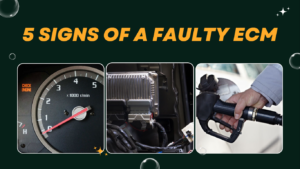
The Engine Control Module (ECM), also known as the Engine Control Unit (ECU), is a vital component that connects your engine to the central computer of your vehicle. The ECM oversees most of the engine’s functions by utilizing information from other systems and electronic components within the vehicle.
A damaged or faulty ECM can lead to significant issues for the engine as it won’t be managed properly. When the engine isn’t functioning correctly, your vehicle will experience performance problems. This highlights the crucial role the ECM plays in ensuring the optimal operation of your vehicle.
Recognizing the signs of a faulty ECM is important so that you can address the issue promptly. Here are five common symptoms that indicate a problem with the ECM:
Bad Engine Control Unit Symptoms in Vehicles: Here are five common symptoms of a faulty engine control unit in a vehicle.
1) Poor Engine Performance (hesitation when accelerating)
One noticeable symptom of a malfunctioning engine control module is a decline in engine performance. The engine may exhibit poor timing and may not efficiently generate power as it did during the combustion process. Consequently, this can impact your vehicle’s acceleration when pressing the gas pedal. If you encounter any issues with acceleration, it may be due to a faulty engine control module.
2) Engine Stalling
In addition to diminished engine performance, you may experience engine misfires or frequent stalling. This does not necessarily indicate a problem with the engine itself, but rather a potential malfunction in the engine control unit. The stalling episodes may be inconsistent, occurring intermittently. Even if the stalling happens just once, it is advisable to address the issue promptly.
3) Poor Fuel Efficiency (Symptoms of Low-Quality Gasoline)
When the engine control module malfunctions, the engine may struggle to determine the correct amount of fuel needed for the internal combustion process. As a result, it may consume more fuel than necessary to operate normally, leading to decreased fuel efficiency and higher costs at the gas station.
4) Check Engine Light
An obvious indication of a potential ECM problem is when the check engine light appears on the dashboard. This warning light could signal various engine issues, with the engine control unit being a possible culprit. To identify the specific problem, you will need to use a diagnostic scanner.
5) Car Failure to Start
If your vehicle fails to start without any apparent reason, it could be due to a faulty engine control module or complete malfunction of the system. The engine may still turn over but will not start running. When the engine control unit is dysfunctional, it cannot send electronic commands to the engine for operation.

